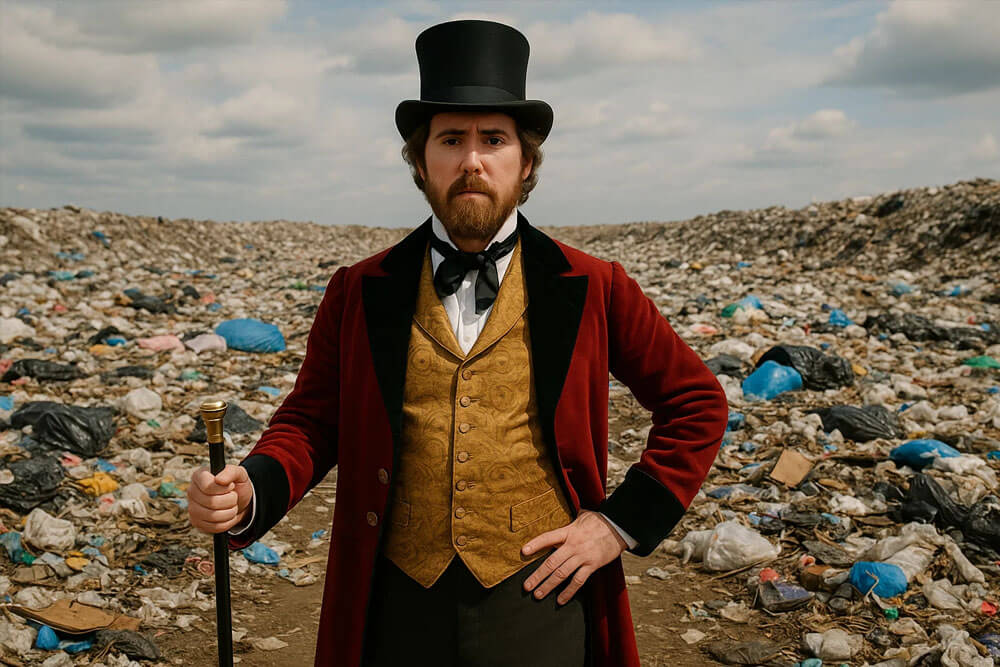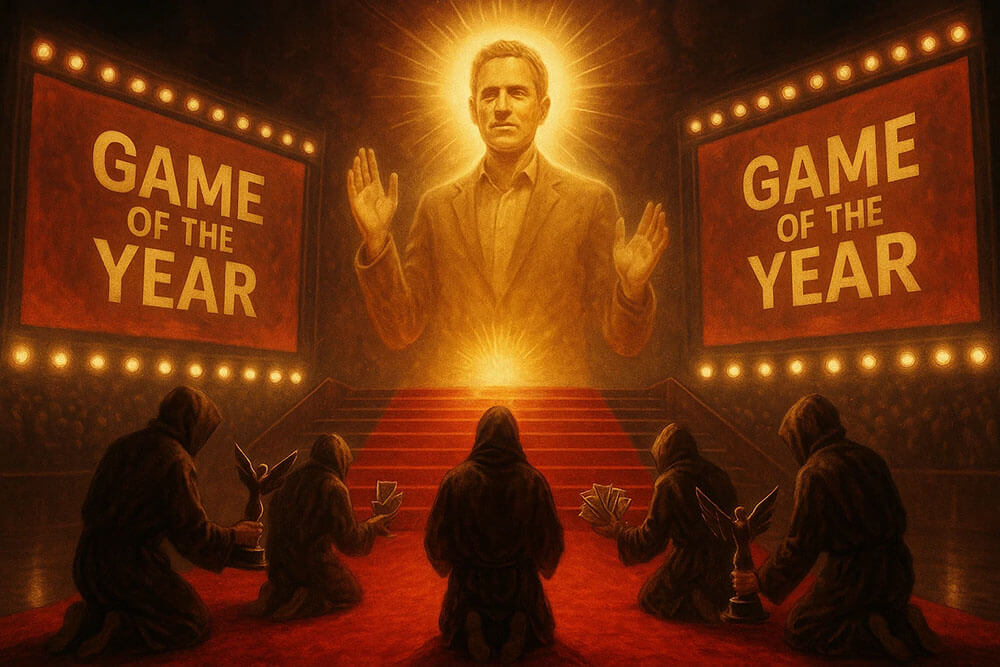There was a time when critics were feared. When a bad review could shatter egos and force artists back to the drawing board. When a journalist’s pen was sharper than any corporate sword.
Today, game “journalists” have traded their swords for foam fingers, happily cheering from the bleachers as billion-dollar corporations kneecap the art form they were meant to protect.
I don’t sit at the industry’s dinner table, nodding along between sips of free Chardonnay. I represent the gamer — and it’s time to name names.
Access Over Integrity: The Cult of the Cheerleader
Modern game journalists are not watchdogs. They are access merchants. They sell their independence for the privilege of sitting across from an executive and asking, “How proud are you of your incredible journey?”
Dean Takahashi of VentureBeat is the high priest of this approach. His entire career is a shrine to access: reprinting corporate talking points verbatim, soft-lobbing questions, and faithfully amplifying whatever narrative executives choose to sell this quarter.
Developers and executives flock to him because he is safe. He is their confessor, their brand therapist. Not once does he ask the only question that matters: Is this making better games?
The Soft Culture Cop: Paul Tassi
Paul Tassi of Forbes is the gentle enforcer. He presents himself as “balanced” and “reasonable,” but always in service of the same ideological boundaries.

When players revolt against predatory monetization or design betrayals, Tassi stands ready to scold them for being “entitled,” while he pats the developers on the head for their “hard work.”
He is the polite hall monitor of corporate gaming — the kind who smiles as he writes you up for running in the halls.
The Controlled Rebel: Jason Schreier
Then we have Jason Schreier of Bloomberg, the industry’s self-anointed rebel. He positions himself as the intrepid insider, the one brave enough to spill secrets from the belly of the beast.
Yet his exposés never cross the ultimate red lines. He critiques labor practices, mismanagement, and crunch — all fair and important. But he never interrogates the deeper ideological capture or creative cowardice infecting modern game development.

He will never ask why entire franchises have been gutted to appease activist mobs or marketing demographics. He will never challenge the ideological uniformity suffocating genuine artistic risk. He is a rebel in safe, pre-approved territory.
The Community Shepherds: Niche Gaming Sites
Then there are the so-called “community” sites — outlets like MassivelyOP and similar niche sites that claim to represent the players. They present themselves as grassroots allies, closer to the heartbeat of the community than the big corporate outlets.
In reality, they play a different game: they are community shepherds. Their true function is to guide, moderate, and soothe. They balance precariously between maintaining access to developers and pacifying frustrated players. Instead of defending the gamer’s interests above all, they act as gentle handlers — defusing outrage, rationalizing shallow updates, and shifting focus to superficial “good news” stories.
They condition players to accept endless monetization schemes, content droughts, and broken promises under a constant wash of positivity. They repeat the same mantras: “Be patient,” “Think of the developers,” “It will get better next patch.”
These sites could have been powerful voices for real player advocacy, especially among audiences who crave deep, meaningful virtual worlds. Instead, they have chosen the pasture — to keep the flock quiet, grazing, and docile while the industry strips away everything that once made these worlds magical.
The Entertainer Enablers: YouTubers and Streamers
Rising alongside these written outlets is a new priesthood in casual clothes: the YouTubers, streamers, and gaming influencers. Once framed as scrappy outsiders speaking for the player, they now sit comfortably as powerful brand partners and marketing mouthpieces.
Many of these personalities built their empires on “authentic” outrage or raw commentary, but success transformed them. Early access privileges, sponsorship deals, and algorithm-driven monetization chains have turned them into unofficial PR extensions. Even self-styled “angry” critics rarely bite the hand that feeds them too hard, lest they lose future perks or audience favor.

Personalities like Angry Joe or Asmongold may offer stinging words, but they remain careful not to challenge the systemic rot or ideological capture at the heart of modern game design. They criticize the surface — broken launches, bad balance patches — but avoid deeper questions about artistic decay or the corporatization of virtual worlds.
Worse still, studios now design entire games and updates around these influencers. Worlds are flattened into stage sets for reaction content rather than built as immersive experiences for players. Communities become cults of personality orbiting content creators instead of living, breathing social ecosystems.
These entertainers were supposed to liberate the player voice from corporate media. Instead, they’ve become the final, smiling enforcers of the same machine — just with better lighting and more emotes.
The Ceremonial Enablers: The Game Awards and D.I.C.E.
Beyond the journalists lies the ritual pageantry that props up this rotten edifice: The Game Awards and D.I.C.E.
The Game Awards, run by Geoff Keighley, function as the industry’s grand annual sacrament — a polished, brand-safe spectacle designed to reinforce hype and sanctify marketing cycles. It is not a space for honest reflection or critique; it is a cathedral of consumption where mediocrity is paraded as triumph and executives are elevated to celebrity saints. Gamers are not participants; they are the audience expected to clap on cue.

D.I.C.E., meanwhile, is the inner sanctum — a private confessional where industry elites congratulate each other away from the public eye. Here, developers and executives reaffirm their shared dogmas, hand out awards to keep the social order intact, and fortify the ideological walls that keep real challenge and risk-taking safely outside. Once a developer or game is blessed by D.I.C.E., it becomes almost sacrilegious to criticize it.
Together, these institutions don’t just celebrate games; they shield the industry from accountability. They transform what should be a vibrant creative ecosystem into a stagnant court of courtiers and jesters, endlessly praising each other while the real magic of gaming quietly dies outside their gates.
From Watchdogs to Lapdogs
Games journalism was supposed to serve the gamer, not the brand. To speak truth to power, not echo it.
But now? These outlets are marketing arms. Their function is to pre-chew the corporate narrative and regurgitate it to the player base in digestible, “positive vibes” form. They are the ministry of fun, but without the fun — a chorus of yes-men with keyboards.
The price for their access is silence on the real betrayals:
- The death of real challenge and mastery in favor of “engagement metrics.”
- The disintegration of virtual worlds into casino-like treadmill zones.
- The ideological subversion of characters and stories to serve shallow moral signals.
- The gaslighting of loyal, paying players into thinking their dissatisfaction is a personal failing.
The Gamer’s Forgotten Voice
The industry’s cathedral of praise will keep echoing — but it grows emptier by the day. The real players are slipping out the back door, tired of being condescended to, tired of paying for the privilege of being lied to.
They don’t want slogans. They want worlds. They want risk. They want fun.
I represent them. And I will keep writing until the last echo dies, and the last brand priest falls silent.
—Wolfshead





I am not sure if you got Paul Tassi exactly right.
Paul Tassi regurgitates what he reads on forums and elsewhere extremely well, this was always his mode of journalism and writing, he can sum up the gist and expand on that perfectly. His own take on something? I have never seen the real PT behind all that. Or is he really the hall monitor type? He is good at watching and observing indeed. Is he really so much against the gamers he constantly observes and who provide him with all he writes about? Does he see benefit from siding with wokeness and developers or staying silent on certain things, watching how they develop and what to say? I still wonder how he ever managed to write for Forbes.
There were once real printed games magazines, most died, some went online-only, some are still in print. Their role seems to have been taken over by the “community shepherd” websites. The remaining few profitable games magazines all suck up to developers for access, they are no longer the gamers for gamers they used to be.
Youtubers and Streamers, Twitch likely being the worst, are a very sad replacement for blogs. I still wonder that people PAY and “subscribe” to people playing video games and sometimes jabbering something. Slightly more interactive and expensive TV watching, I am afraid. Who actually does that? Apparently by far too many regularly.
I tell you, when I played MMOs, I would not have had time watching someone ELSE play the games, I would play them, nonstop, too much. What happened to people.
Video game journalism and journalism in general are in a crisis. At first bloggers and podcasters jumped into the void the decline of journalism into activism brought, but many are now paid as well and no longer genuine.
Thankfully young people are often wiser than we think and notice this as well, but unfortunately the dumb mass rules and still falls for this nonsense. One cannot believe how much people can betray themselves when they KNOW inside something is wrong but still go with the flow “oh, this is great, body type 1 and 2, sooo inclusive, yay!!”, just an example to highlight how people start aping and applauding things too many feel they are just wrong. Just like some decide to go all in, certain Users like Dan… hehe, sorry, could not resist.
There is that moment when people realize that actually most don’t like the nonsense they swallowed and were now spewing out themselves. But unfortunately there is always a job in the woke industry and they go on as they did.
I think when it comes to the youtuber/streamer thing, instead of it being just TV watching it’s a bit closer to hanging out with a friend because you can interact with them and develop a relationship, although usually it’s just a parasocial one. Usually they aren’t an actual friend, they have just made it their job to entertain and be like a friend, but the dynamic is somewhat similar.
I guess you could say they found a niche that needed to be filled. I hang out with my real friends maybe a few times a year nowadays because we are just too busy, our schedules always clash. When I have free time it’s really easy to just pop into a stream and have a limited interaction with one of the many “friends” that are online at the time. As usual though, convenience comes at a cost.
Excellent point!